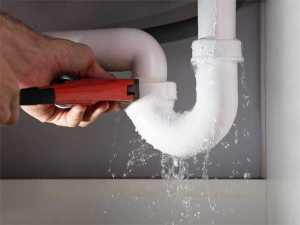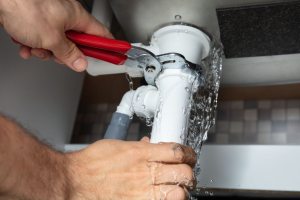Leaks are among the most prevalent, frustrating, and destructive plumbing issues that a house may have. Even a little pinhole leak may break drywall and cause severe problems, not to add waste and higher utility costs. Yet, leaks provide a unique challenge when it pertains to identifying and correcting them. Except if the hot water leak appears within one of your living area’s several exposed pipes, you’re unlikely to know which the hot leaking is.
This is why you should hire a skilled plumber from Mosman to conduct the repair job. Plumbers provide a crucial service called leak detection. In addition, licensed plumbers may use the procedures listed below to locate leaks and fix them properly and promptly.
How to Diagnose and Repair Hot Leaking?
You do not have to be powerless and perplexed regarding your leaky water heater. Continue reading for specific basic actions individuals may require and options for minor repairs when they feel confident.
What are Hot Leaks?
Hot leaks occur in the hot water system, which includes the water heater, pipes, and appliances that use hot water, such as faucets and showers. Hot leaks can be caused by various factors, including worn-out parts, faulty installation, and high water pressure.
Causes of Hot Leaks
There are several causes of hot leaks, including:
- Worn-out parts: Over time, parts of the hot water system, such as pipes, valves, and fittings, can wear out and develop leaks.
- Faulty installation: If the hot water system was not installed correctly, it can lead to leaks and other problems.
- High water pressure: Excess water pressure can cause pipes and other parts of the hot water system to fail, leading to leaks.
- Corrosion: Corrosion can occur in the hot water system due to the use of hard water, which can cause pipes and other parts to deteriorate and leak.
- Temperature and pressure relief valve failure: The temperature and pressure relief valve is an important safety device that can fail, causing hot water to leak.
Examine Your Water Heater To See If It Is Leaking
It’s critical to know more about a hot leaking rather than condensation causing moisture. Condensation is not an issue. It implies that the water heater is extremely hot, yet the space in which it is placed is extremely cold. You may put this to the test by cleaning and drying your hot water system. Then, take a good look at the outside.
Signs of a Hot Water Leak
Identifying a hot water leak early can prevent costly damage to your home. Here are some common signs of a hot water leak:

- Warm floors or walls: If you feel warmth on floors or walls, it may be an indication of a hot water leak.
- Unexplained increase in water bill: A sudden spike in your water bill may be due to a hot water leak.
- Water discoloration: If your water appears rusty or discolored, it may be a sign of a corroded pipe or appliance.
- Decreased water pressure: A leak in your hot water line can cause a decrease in water pressure.
Moreover, condensation is probable when liquid forms uniformly throughout the surface. Next, determine if your air conditioner or furnace is leaking water. You may check the water source by placing hand towels on the surface.
Switch the Power off
After determining the source of the leaking is your hot piping system, switch the power off quickly. You must also refrain from working on your hot water system when it is connected to power. When you have a battery-powered water heater, locate the circuit breaker and turn the water heater button to the OFF position. Instead, call the emergency plumbing to assist you and prevent unnecessary accidents.
Turn off the Cold Supply of Water
The following step is to turn off the cool water supply to your hot water system. Two pipes are attached to the top of your hot water system container. A shutdown valve is on the cold supply input pipeline among most water heaters. This is the source of your water system. The cold water intake line, often marked by blue indicating cold or red indicating warm, supplies cold water to the water tank.
Moreover, the warm output pipe distributes hot water from the water heater throughout your house. When the pipes are not colour marked, you may feel which ones are chilly to the touch and which are heated.
Locate The Cause Of The Water Leak
Once you’ve switched off your electricity and water, it’s time to locate the source of the leak so you can properly diagnose and fix it. Determine and clean up any areas where water accumulates. The next day, when you observe a buildup of water in the exact location, you will know where to begin fixing your hot leaking.
In addition, examine the two pipelines on the top of your hot water system to conduct pipe relining services. These are known as the cold inlet nozzle and warm water outflow pipes. These pipes transport water to the tank to be heated before returning it to your residence. This might also cause your leak when their connections or relations are loose. In this scenario, a pipe wrench may compress the pipes.
Checking Water Meter
The first step is to check the water meter. Turn off all water sources and note the meter reading. Wait for a few hours and check the meter again. If the reading has changed, it indicates that there is a leak in the system.
Turning off All Water Sources
Turn off all water sources, including faucets, showers, and appliances that use hot water. Check the water meter again. If the reading has not changed, it indicates that the leak is in the hot water system.
Checking Hot Water Appliances
Check all hot water appliances, including the water heater, faucets, and showers, for signs of leaks. If you find a leak, it is likely the source of the hot leak.
Repair a Water Heater Leak
Rinse the water. Water may be the source of a variety of issues. It can bend buildings, destroy goods, and invite insects or mould. It’s better to clean things up right away with Mosman plumber.
Make an Appointment With a Professional
When your water heater is still leaking water following troubleshooting, you may always contact a pipe relining services for assistance. It may be necessary to hire an expert to repair your water heater.
Should You Have Your Pipes Relined or Replaced?

When it comes to repairing pipes, there are two available methods: pipe replacement or pipe relining services. As the name implies, replacement entails physically removing the defective line and replacing it with a new pipe. Pipe rehabilitation is a contemporary procedure that includes repairing damaged or leaky pipes from within, utilizing just the current entry points, without excavation or digging. Plumbing professionals use a specialized substance to form a new pipe inside an old line, and the rigid material closes up any gaps.
How Much Time Will It Take?
The time needed to restore a pipe is determined by several variables, including how visible the pipeline is, how much excavation or destruction is necessary, and the number of sites that must be repaired. It might range from a couple of hours to more than a day. When the pipe rehabilitation is done, the excavated portions must be tidied up and fixed, which extends the project duration.
Furthermore, pipe relining technology takes a portion of the time that conventional restoration techniques do, and based on the project size, it may be completed in as little as a couple of hours. After the pipe rehabilitation is finished, the pipes will be fully operational with nothing left to perform, and everything will look just as it did before the renovations.
Conclusion
Do not be alarmed when your water heater has a hot leaking. You may seek assistance from a water heater professional to evaluate and fix hot leakage. They will investigate the leak and set it up as soon as possible. Civic Plumbing’s skilled staff is eager to discuss how they can collaborate on this job. Experienced plumbers in hot water systems could efficiently analyze your household’s needs.

